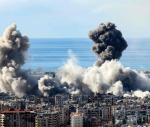You are here
Ending war in Syria possible without outside intervention
Apr 19,2018 - Last updated at Apr 19,2018
A total of 500,000 dead and counting. President Bashar Assad is going full blast at reducing the parts of his country still standing, but not under his control, to rubble. Russia hangs on his tail, providing both planes and soldiers but seemingly unable to wag the dog. The US launches, along with Britain and France, a brief rocket attack. Should we now after two such attacks call President Donald Trump “Rocket Man 2”?
The attack is supposedly to draw the line on Assad’s use of chemical weapons. Perhaps he did do it, or possibly one of his local commanders took the initiative, but it is small beer compared with the horrors inflicted by conventional weapons day in day out. The UN Convention outlawing the use of chemical weapons was aimed at big time use of them when they become dangerous enough to dominate a battle field, as the Germans used them in the First World War and Saddam Hussein, then supported by US arms sales, used them against Iran and against his own Kurdish population when 5,000 were killed.
So what do the outside players do next? Do they know where they are going? Trump last month said he’s pulling out his 2,000 soldiers inside Syria. Now, his Secretary of Defence James Mattis says they will stay. Most, if not all the EU countries, appear to back, or at least tolerate, the supportive bombing action of UK Prime Minister Theresa May and French President Emmanuel Macron. Neither know much about the complexities of the Middle East, but have decided to throw in their lot with Trump who knows even less.
The three of them must have been told by their advisers that this attack is chicken feed compared with the murder that goes on every week. It, and the two previous uses of chemical weapons, are a small item in the seven years of civil war. They barely impinge on Assad. To be coherent, the three nations should commit themselves to tens if not hundreds of thousands of boots on the ground to topple Assad. But they are very unlikely to do that. So where is a coherent explanation for what they have just done?
I recall what America’s top strategist, the late Zbigniew Brzezinski, wrote in Time magazine a year ago: “The Syrian conflict is a sectarian war in a volatile region whose potential to spread and directly threaten American interests would only be increased by US intervention…, American involvement would simply mobilise the extreme elements of the factions against the US and pose the danger that the conflict would spill over into the neighbourhood and set Jordan, Iraq and Lebanon on fire. (The factions he mentions are Saudi Arabia, Qatar, Iran, Sunni Salafists, Iranian-aligned militias, Al Qaeda and ISIS)…, The recent Israeli bombing of weapons’ sites inside Syria conveys to some Arabs the sense that there is an external plot against them. That impression would be solidified if the US were now to enter the fight, suggesting a de facto American-Saudi-Israeli alliance, which would play into the hands of the extremists… The various schemes that have been proposed for a kind of tiddlywinks intervention from around the edges of the conflict, no-fly zones, bombing Damascus and so forth, would simply make the situation worse.”
So what should be done by the Western powers? At the moment, they do not seem to have any ideas, or not ones they want to share with the public, maybe because they know they will ridiculed. Mr Trump, is it all leading to an attack on Iran? The talented Danish artist, Linda Balle, writes on one side of one of her drawings, “Now Here”, and on the other side, as her dancing figure traverses the page, writes, “No Where.” That is how it seems to be with the three Western allies.
My answer is for the Western powers to remove themselves from the fray, apart from providing humanitarian aid. They should persuade Assad, in return for ending their military involvement, to make sure it is distributed around the country fairly. Aid organisations should be allowed free passage to wherever they choose to work.
The US, the EU, Russia and Iran should apply themselves to negotiations. The previous UN effort failed partly because Iran, on the insistence of the US, was kept out.
The outside powers must accept, however distasteful it may seem, that Assad has won the civil war. Like it not, that has to be the starting point. The outsiders, after conceding that, should demand amnesty for those who have opposed the regime.
The Russians would support this. They have been trying to withdraw for quite some time but events keep pulling them back. As for Iran, it needs an entente with Syria rather than a future war.
The pursuit of peace is possible, even at this late stage. But it has to be given priority. Bombing goes nowhere.












